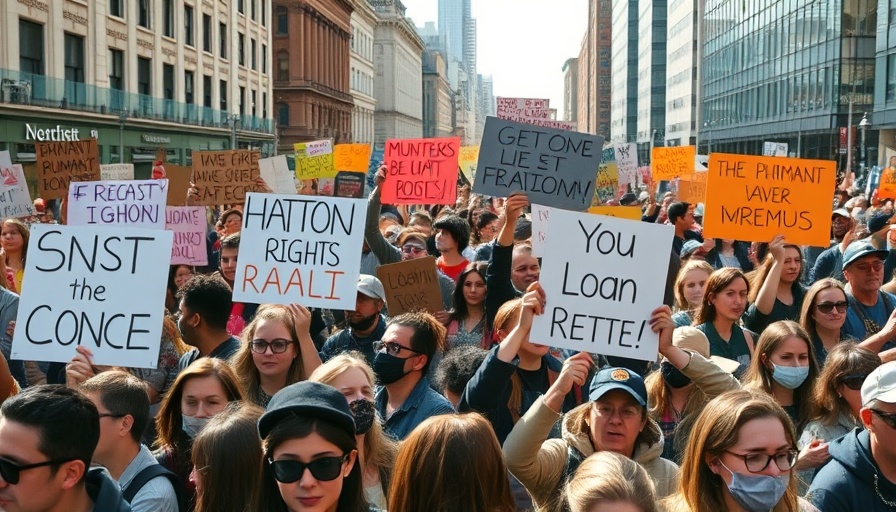
Reflecting on Two Decades of Democratic Aspirations
As Nigeria marks 26 years of uninterrupted civilian rule, the tone across the nation is a blend of celebration and frustration. This milestone, commemorated on Democracy Day, prompts a necessary reflection on the state of democracy in a nation where the promise of governance often clashes with the harsh realities faced by its citizens. Since the 1999 restoration of democratic governance, Nigeria has enjoyed political stability amidst turmoil in nearby nations, yet this achievement is overshadowed by rising hardship.
In 'Celebration and protests: Nigeria marks 26 years of uninterrupted democracy', the discussion dives into the contrasting sentiments surrounding this critical milestone, prompting a deeper analysis of the current state of governance in Nigeria.
Understanding the Discontent
In bustling cities like Lagos and Abuja, crowds voiced vehement dissatisfaction over the leadership, with protesters decrying economic mismanagement. Protester voices echo sentiments of hunger, exorbitant prices, and the inadequacy of essential services, driving a wedge between the government's narrative and the people's lived reality. The struggle against high inflation has become a rallying cry, exemplified by Hassan Taiwto's hashtag and End Bad Governance movement, which highlights the disillusionment many Nigerians feel toward their leaders.
Celebration Amidst Challenges: A Divided Consciousness
For supporters of the government, Democracy Day was an occasion for rejoicing, acknowledging what they view as a successful transition to civilian rule. Yet, this optimism is juxtaposed against a backdrop of unanswered grievances. Protests this year were notably peaceful, but they serve as a reminder that the silence or passivity in previous years does not always equate to satisfaction. The protesters assert that Nigeria's political leaders must address the systemic failures within the legislature and judiciary to usher in true democratic practices.
Legacy of Democratic Institutions: A Critical Assessment
While Nigeria's uninterrupted democracy is commendable, the effectiveness of its democratic institutions is under scrutiny. A look at two-and-a-half decades reveals frustrating patterns of governance failure. Citizens are demanding accountability, as authorities misuse police power to stifle dissent, and many are questioning the integrity of electoral processes. For Nigeria to celebrate its democratic journey meaningfully, leaders must implement reforms that address the citizens' most urgent needs.
The Wider Implications for Africa’s Governance Landscape
Understanding Nigeria's struggles provides insight into the broader governance challenges facing Africa today. As Nigeria transitions into its 27th year of democracy, the need for robust democratic institutions becomes paramount, especially as other nations face similar trials. The call for transparency has never been louder, echoing through various African nations grappling with leadership that seems disconnected from the needs of the populace.
Looking Ahead: The Future of Democracy in Nigeria
As Nigeria seeks to mend the rifts between the government and its citizens, the future hinges on the government's willingness to execute meaningful change. The balance of celebrating democratic milestones while addressing discontent indicates possible frailty in the nation's democratic fabric. This dynamic creates a critical juncture for socio-political reform and citizen engagement, essential for shaping an inclusive and equitable Nigeria.
Political leaders must not only listen but act on the grievances expressed by their constituents. For democracy to flourish, the government must invest in infrastructure, security, and essential services, rekindling hope for millions of Nigerians who feel neglected. Therefore, as we look to the future, the need for informed civic engagement remains indispensable—each citizen's voice matters in demanding a government that truly represents their needs.
Conclusion: Rallying for Progress
Nigeria's Democracy Day serves as a poignant reminder of the nation's legislative journey, enveloped by both celebration and protest. Moving forward, it becomes ever more critical for citizens to remain vigilant and engaged in the political process. As voices continue to rise against perceived injustices, it’s imperative for the government to respond with actions that reflect a genuine commitment to democracy and the welfare of its people. This is not solely a fight for today but a foundation for Nigeria's tomorrow.
 Add Row
Add Row  Add
Add 




Write A Comment